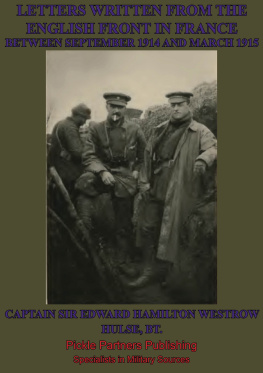
This edition is published by PICKLE PARTNERS PUBLISHING www.picklepartnerspublishing.com
To join our mailing list for new titles or for issues with our books
Or on Facebook
Text originally published in 1919 under the same title.
Pickle Partners Publishing 2013, all rights reserved. No part of this publication may be reproduced, stored in a retrieval system or transmitted by any means, electrical, mechanical or otherwise without the written permission of the copyright holder.
Publishers Note
Although in most cases we have retained the Authors original spelling and grammar to authentically reproduce the work of the Author and the original intent of such material, some additional notes and clarifications have been added for the modern readers benefit.
We have also made every effort to include all maps and illustrations of the original edition the limitations of formatting do not allow of including larger maps, we will upload as many of these maps as possible.
LETTERS FROM A LIAISON OFFICER
FERDINAND FRAZIER JELKE
TABLE OF CONTENTS
Contents
TABLE OF CONTENTS
DEDICATION
TO MY MOTHER
Whose love, complete understanding, sympathetic and devoted interest, more than all other factors combined, sustained and encouraged me through the trying and unfamiliar demands of my War-time sojourn Over There, I lovingly dedicate this little volume of experiences.
FERD.
New York,
Nineteen Hundred and Nineteen.
FOREWORD
It goes without saying that the letters here gathered were not written with any idea of being permanently preserved. They were merely a progressive recital, in a most informal and unstudied vein, of circumstances and scenes with which the writer came in touch in the course of his work, first in the ranks of the Marine Corps, and afterward as a Lieutenant of Infantry in the Liaison Service, in France.
But since the authors return from Over Thereand in view of the gigantic scale of World War and the epochal character of the events and situations touched upon in the correspondencemembers of his family have urged that the series of letters written from the scenes of his activities during 1917-19, be made into a handy volume for the use of such friends as may find in them some personal appeal and interest.
In preparing the letters for publication an attempt has been made to omit the more private and intimate details, while retaining such of the descriptive text as would aid the reader in gaining some lasting impressions of the scenes and incidents which rushed by, like an animated panorama, in those days of frenzied endeavor and kaleidoscopic change, beginning shortly after Americas entrance into the war and continuing until after the signing of the Armistice, and the return of the writer to America, early in 1919.
Nothing has been added to the original text, except names of places and certain military data which could not be included at the time, though much has been eliminated. It has been the purpose to preserve only so much detail as would be essential to a proper understanding of the situations described, and there is, of course, absolutely no attempt at literary style or impressive presentation.
F. F. J. May,
Nineteen Hundred and Nineteen.
MILITARY RECORD FERDINAND F. JELKE
Enlisted, 5th Regiment (Base Battalion) U. S. Marine Corps, July 14, 1917, at Washington, D. C.
Sailed for France on U. S. S. Henderson, August 3, 1917, acting as interpreter.
Promoted August 17, 1917, to Corporal, U. S. Marine Corps.
Attached to War Risk Bureau (Paris), November 4, 1917.
Attached to Chief Liaison Officer (Paris), February 12, 1918.
Commissioned Second Lieutenant, U. S. Infantry, March 17, 1918.
Attached to staff of Commanding General, Fifth French Army Corps, as Liaison Officer, April 27, 1918, in which capacity I served until after the signing of the armistice, December 12, 1918.
Landed at New York, U. S. S. Sierra, March 6, 1919.
Discharged from service March 8, 1919, at Camp Dix, N. J.
LETTERS FROM A LIAISON OFFICER
U. S. S. Henderson At Sea, August 19th, 1917.
HIS is another tranquil August day, when nature seems to be at peace with the entire world. The trip has been uneventful, with the exception of hard work, drilling, holystoning the decks and long hours for the menreally a fine lot who enlisted for patriotic reasons last April. They are from small towns and farms in almost every state in the Unionone hundred and fifty from the University of Minnesota, all in one company. It was said at the Philadelphia Navy Yard that this is the best bunch of recruits that has gone to France. For three days we have been in the War Zone, but no one is worried, and gives it little serious thought. Every known precaution is taken, dozens of men on the superstructure constantly are on watch with field glasses. The gun crews for the six-inch guns are on duty day and night, relieved every four hours. Fire and emergency drills are held daily, frequently during the night.
As we came in sight of land, early this morning, the bugle sounded General Quarters, and every one rushed to their stations at double-quick. The convoy spread out, commenced manoeuvring and circling, and the guns started booming at objects between the ships; aeroplanes circled overhead like birds, dropping high explosive bombs. We were in the midst of a flotilla of submarines, our first engagement with the enemy. As the cannons roared and belched, the ship quivered so violently fourteen windows in the officers mess were broken.
One submarine was sunk.
Lots of love, from
FERD.
Bordeaux, France, Sept. 10th, 1917.
I HAVE an opportunity this morning to drop you a few lines, good paper with American pen and ink, which is quite a treat. Until within the past week I have been living under such rough conditions, on shipboard and in camp, the life of an enlisted man, there has been little opportunity to write, except to scratch a few lines home.
Colonel Bearss has been put in command of the largest receiving port in France where the greater part of the new National Army will be landed, and the work of preparing to handle them is most interesting. There is already a large receiving camp at Songes and it is to be enlarged to accommodate forty thousand. There are to be over five hundred thousand men {1} , two hundred and fifty thousand animals, and hundreds of thousands of tons of freight landed here. There are to be miles of railroads, warehouses and docks built.
We landed a month ago at St. Nazaire, where about one-fourth of the American Army is to be handled. About ten days ago Colonel Bearss, with a staff of six officers, three interpreters (Le Gendre, Auguste Ferrier of New Orleans, and myself) motored down from St. Nazaire to take charge of Base Section No. 2. We have requisitioned a large four-story office building and there are to be, in all, about eighty officers {2} and two to three hundred clerks.
It is the opportunity of our lives to witness and be part of the advance of a great army. Our services as interpreters have really been valuable. This is most interesting work, as it brings us in contact with the highest staff officers. As you know, Colonel Bearss is a field man, and has a long fighting record in the tropics, including Santo Domingo and the Philippines.











